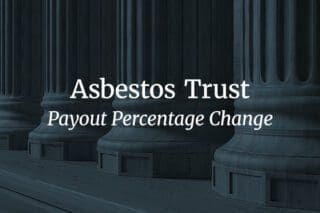A law that dismisses specific asbestos-related disease claims after 10 years was deemed unconstitutional by the Indiana Supreme Court on March 2 because it treats similar asbestos victims differently. The repose law falls under a provision of Indiana’s product liability act.
More specifically, the repose law allows suits to pursue against defendants who both mined and sold raw asbestos, but sets a 10-year limit on claims against companies who did not engage in both mining and selling raw material.
The court deemed this unconstitutional based on the fact it violates the equal privileges and immunities clause of the Indiana Constitution. This was the outcome of a split decision stemming from three appeals.
Now, two Indiana asbestos disease victims, Larry Myers and the survivor of Raymond Geyman, can pursue asbestos claims against companies such as Crouse-Hinds Division of Cooper Industries, Inc., General Electric Co., and Owens-Illinois, Inc.
The victims’ cases involve two sections of Indiana’s product liability and asbestos product liability laws, which have different time limits for which asbestos claims are required to be filed.
Section 1 of Indiana Code 34-20-3-1 (the general product liability statute) gives a two-year discovery statue of limitations. The statute of repose limits claims to within 10 years of delivery from product to consumer.
Section 2 (the asbestos products liability law) Indiana Code 34-20-3-2(a)(2) omits the 10-year repose and “applies only to product liability actions against persons who mined and sold commercial asbestos.”
Manufacturers have used the Section 2 code for years saying it did not apply to them seeing as they simply sold products, not mined the asbestos in them.
The final ruling came from the Indiana Supreme Court’s 2003 decision in AlliedSignal, Inc. Vs. Ott, 785 N.E.2d 1068. Ottwas questioned 11 years later with appeals. The Indiana Supreme Court then denied summary judgments to GE and Ownes-Illinois.
Another judge did not agree citing his obligation to follow Ottas a precedent and grant Crouse-Hinds a summary judgment. However, the high court declined his opposing view and continued to move forward with the question as to whether the law’s different treatment of two types of asbestos victims was constitutional.
“Here, the two classes of asbestos victims are similarly situated (both are victims of asbestos illness or disease), yet only one of them (the class seeking damages from defendants who both mined and sold raw asbestos) is completely excepted from the statute of repose,” said the court.





